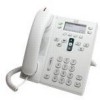Cisco 6941 Administration Guide - Page 111
Customizing the Cisco Unified IP Phone, Customizing and Modifying Configuration Files
 |
UPC - 882658277801
View all Cisco 6941 manuals
Add to My Manuals
Save this manual to your list of manuals |
Page 111 highlights
6 C H A P T E R Customizing the Cisco Unified IP Phone This chapter explains how you customize configuration files and phone ring sounds, and how to disable the phone screen to conserve power. Ring sounds play when the phone receives a call. This chapter includes these topics: • Customizing and Modifying Configuration Files, page 6-1 • Creating Custom Phone Rings, page 6-2 • Configuring the Idle Display, page 6-4 • Automatically Disabling the Cisco Unified IP Phone Backlight, page 6-4 Customizing and Modifying Configuration Files You can modify configuration files (for example, edit the xml files) and add customized files (for example, custom ring tones, call back tones) to the TFTP directory. You can modify files and add customized files to the TFTP directory in Cisco Unified Communications Operating System Administration, from the TFTP Server File Upload window. Refer to Cisco Unified Communications Operating System Administration Guide for information about how to upload files to the TFTP folder on a Cisco Unified Communications Manager server. You can obtain a copy of the DistinctiveRinglist.xml and List.xml files from the system using the following admin command-line interface (CLI) "file" commands (for exact syntax, refer to the Command Line Interface Reference Guide for Cisco Unified Communications Solutions): • admin:file - file list - file view - file search - file get - file dump - file tail - file delete Cisco Unified IP Phone 6921, 6941, 6945, and 6961 Administration Guide for Cisco Unified Communications Manager 8.5 (SCCP and SIP) OL-23769-01 6-1















